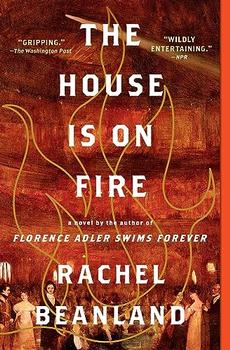Summary | Excerpt | Reviews | Beyond the Book | Readalikes | Genres & Themes | Author Bio

"Fauquier."
This might have been the right time for Mr. Scott to offer the women some cursory details about his life, or to ask them something about theirs. Instead, he fumbles with the watch fob that hangs from his waistcoat and checks the time. Margaret is not one to be easily put off, so she makes a show of looking around the box. "And is your wife with you this evening?"
Sally presses the toe of her shoe on Margaret's foot. Her rule, when she accepted Margaret's invitation to come to Richmond for the season, was that there would be no matchmaking.
"I'm here alone," says Mr. Scott.
The answer is evasive, and Sally knows Margaret won't like it, so she tries to steer the conversation into safer waters. "Do you like Diderot?"
Mr. Scott blinks at Sally. "Not particularly." She waits for him to continue, to argue that Diderot was an atheist or even that his plots are flimsy. But he doesn't justify his position.
Margaret can't let him off the hook. "Is there perhaps another playwright you find more appealing?"
"I'm not much for plays," he says and looks relieved when Archie announces his arrival in the box with a booming "What have I missed?"
There are more pleasantries and the puffing up of chests, the display of plumage. Sally removes her coat and, noting that the men have taken all the straight-backed chairs, secures an empty bench that has been pushed up against the box's railing. She pulls it out and takes a seat, placing her jacket and a small handbag beside her.
Over the next few minutes, Sally watches the theater fill.
The pit, two stories below, is a sea of people who never stop moving. Tickets to the pit are cheap, and the seats are few and far apart, so most people abandon them altogether, choosing to spend the duration of the performance on their feet, mingling with their neighbors. At the front of the pit sits the orchestra, its members tuning their instruments to the hum of the crowd.
Sally can't get a good look at the colored gallery, not from where she sits, but she can see into the boxes on the opposite side of the theater. She's searching for people she knows. None of her brothers and sisters, with the exception of Fayette, spend much time in Richmond, but her cousins—particularly on her mother's side—do. Lots of the girls she grew up going to parties with in Lynchburg and Farmville have married well enough to spend Christmas in the capital.
Margaret joins Sally and whispers in her ear, "That Mr. Scott's quite the Don Quixote." Then she gives Sally's shoulder an affectionate bump, and Sally puts her head in her hands and lets out a low laugh that could easily be mistaken for a growl.
"What do I keep telling you?"
"I know, I know," says Margaret. "You're not ready."
"And when and if I am," Sally says, tossing a quick glance behind her, "please, God, not him."
Margaret lets out a loud sigh.
"But I do appreciate it," says Sally, trying to be serious.
"I just want to know that you're going to be all right. You can't live with your mother forever."
"Can't I?" Sally says, and both women allow themselves an earnest laugh.
It was universally acknowledged, among Sally's friends and family, that she had been right to let go of the Marysville house. She stayed on there for more than a year after Robert died, but without the store, she had no income; it soon became obvious that the rent would deplete what little she'd inherited.
Sally thought about returning to Red Hill, but by then her mother had remarried and gone to live at her new husband's home in Buckingham County. The Red Hill property, which Dorothea would have been entitled to keep until her death, had she not remarried, went instead to Sally's youngest brothers, who were ill-equipped to manage a henhouse, much less an entire estate.
When push came to shove, Sally had stored her furniture and household goods at Red Hill and sent her personal effects to her mother's. Then she'd packed a trunk and gone visiting. Her friends and relations were always happy to have her and she worked hard to be useful and to never overstay her welcome. Still, over the last two years, she'd grown weary of the constant travel and longed to settle down.
Excerpted from The House Is on Fire by Rachel Beanland. Copyright © 2023 by Rachel Beanland. Excerpted by permission of Simon & Schuster. All rights reserved. No part of this excerpt may be reproduced or reprinted without permission in writing from the publisher.
Your guide toexceptional books
BookBrowse seeks out and recommends the best in contemporary fiction and nonfiction—books that not only engage and entertain but also deepen our understanding of ourselves and the world around us.